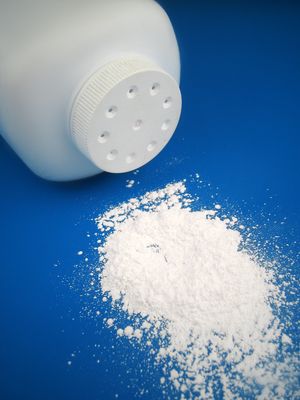 Talc cancer and talcum powder dangers have become widespread concerns and have resulted in several lawsuits against manufacturer Johnson & Johnson.
Talc cancer and talcum powder dangers have become widespread concerns and have resulted in several lawsuits against manufacturer Johnson & Johnson.
In these baby talcum powder lawsuits, consumers allege that they developed ovarian cancer as a result of using the company’s talc powder products, including baby powder and Shower-to-Shower powder.
Johnson & Johnson is facing accusations that the company knew about the risk, but concealed this information for years.
With its wide range of personal hygiene uses, baby talcum powder has become a staple in some bathroom cabinets. Tips on its use are often passed on through generations, and women may apply it to their genital area to treat rashes, dry skin, yeast infections, or odor.
Unfortunately, talc particles may travel up through the fallopian tubes and settle into the ovaries, possibly leading to cancer cells.
Overview of Talcum Powder Dangers
Baby talcum powder is composed of a mineral called talc, which consists primarily of magnesium, silicon, and oxygen. When ground up into fine powder it is used to absorb friction and cut down on moisture, both of which make it a practical feminine hygiene product.
Some talc in its natural form contains asbestos, which is infamous for causing deadly forms of lung cancer, but all talcum powder products produced in the United States for home use have been asbestos free since the 1970s.
Researchers conducting lab studies and population based studies are trying to determine the level of risk over-the-counter talcum powder poses to consumers.
A June 2013 study highlighting the risk of talcum powder was published in the journal Cancer Prevention Research. Researchers from Brigham and Women’s Hospital analyzed data from eight different research papers, which contained information about approximately 2,000 women.
The researchers concluded that there was a 20 percent to 30 percent greater risk for ovarian cancer among women who used talcum powder for feminine hygiene. While it has not been definitively proven that talcum powder dangers cause ovarian cancer, it is recommended that women do not use talcum powder in their genital area.
Women who have been affected by talc cancer may have a product liability case against the manufacturer and should contact an attorney to discuss their options.
Do YOU have a legal claim? Fill out the form on this page now for a free, immediate, and confidential case evaluation. The attorneys who work with Top Class Actions will contact you if you qualify to let you know if an individual lawsuit or class action lawsuit is best for you. [In general, baby powder cancer lawsuits are filed individually by each plaintiff and are not class actions.] Hurry — statutes of limitations may apply.
ATTORNEY ADVERTISING
Top Class Actions is a Proud Member of the American Bar Association
LEGAL INFORMATION IS NOT LEGAL ADVICE
Top Class Actions Legal Statement
©2008 – 2026 Top Class Actions® LLC
Various Trademarks held by their respective owners
This website is not intended for viewing or usage by European Union citizens.
Get Help – It’s Free
Join a Free Baby Powder Cancer Class Action Lawsuit Investigation
If you used Johnson’s Baby Powder, Shower to Shower, or another talcum powder product and were diagnosed with ovarian cancer, you may have a legal claim. Family members of loved ones who died of ovarian cancer can also join. Submit your information now for a free case evaluation.
An attorney will contact you if you qualify to discuss the details of your potential case at no charge to you.












